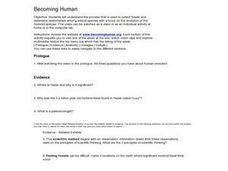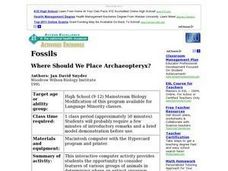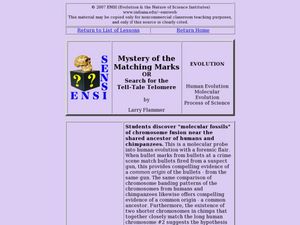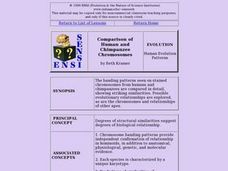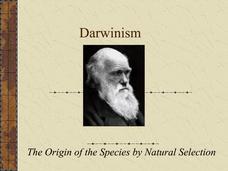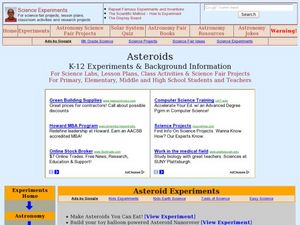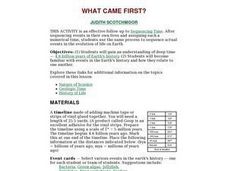Curated OER
Becoming Human
In this evolution activity, learners access a specific website and then answer questions about human evolution based on what they discovered at the website. This activity has 19 short answer questions and 3 essay questions.
Curated OER
Where Should We Place Archaeopteryx?
Students classify Archaeopteryx using pictures of actual fossils and scientist representations of how the animal might have looked. They compare Archaeopteryx's characteristics to those of the five extant vertebrate groups to...
Curated OER
Walking Whales
Eighth graders explore the theory of evolution of whales. For this walking whales lesson students study a reading packet, divide into groups and respond to given questions.
Curated OER
Mystery of the Matching Marks
Students view a Power Point and complete activities related to genetic evidence of human evolution. In this molecular evolution lesson, students view and discuss a provide presentation. They search for the "tell-tale telomere" and...
Curated OER
Physiological Adaptations
Students investigate the concepts of genetics and how it is tied to the variations found within different species and how it is tied to adaptations. They review the theory of evolution and factors found to help create variation. The...
Curated OER
Comparison of Human and Chimpanzee Chromosomes
Pupils actively engage in the careful analysis of chromosome banding patterns and identify examples of inversion in homologous chromosomes.
Curated OER
Understanding the Geologic Timescale
Students identify and analyze how the geologic time scale was developed by investigating 11 periods of time and the vast expanse of time of the Earth's existence. They study their period, determine the important factors indicative to...
Discovery Education
The Time of Our Life
Mammals are some of the newest organisms to appear on Earth. Young scholars complete an activity that results in a timeline showing the appearance of different types of living organisms. Provided with a list that spans from prokaryotes...
Curated OER
Darwinism: The Origin of the Species by Natural Selection.
The Darwin PowerPoint covers many of the Scientists that worked on similar concepts to Darwin and that were involved with famous theories. students are informed about the basic thinking behind natural selection and examples of...
Curated OER
Life Has A History
In this biology worksheet, students identify and match various classes of species found today. Then they explain why biodiversity exists today on earth and define evolution. Students also describe who a paleontologist is and what they do.
Curated OER
Human Evolution
High schoolers make and use observations of Laetoli footprints to provide clues to life in the past. They collect and analyze data to study the relationship between foot length and body height.
Curated OER
Hominoid Skull Comparison
Students are provided with evidence used to support evolutionary theory. They are introduced to classification by using primates as an example. Students read article related to Hominoid Skull Comparison and write a summary about the...
Curated OER
Fossils-Where Should We Place Archaeopteryx?
Students explore an interactive computer activity that provides the opportunity to look at features of various groups of animals and determine where an extinct organism might be classified.
Curated OER
Hominoid Cranium Comparison
Learners describe, measure and compare cranial casts from contemporary apes (chimpanzees and gorillas, typically), modern humans and fossil "hominids" (erect and bipedal forms evolutionarily separated from apes).
Curated OER
Asteroids
Students examine a potential asteroid impact site. They describe evidence and theories for extinction events.
Curated OER
Introduction to Paleontology Lab
Students engage in a lab which introduces them to fossils and paleontology. They examine eleven numbered boxes containing fossils which are related to the questions on this lab then answer questions on a lab sheet imbedded in this plan.
Curated OER
Why do we need Vitamin C in our diet? Or Why do we carry old inactive genes in our genome?
Students explore and explain how mutations in the DNA sequence of a gene may be silent or result in phenotypic change in an organism and in its offspring. They analyze how evolution and biodiversity are the result of genetic changes that...
Curated OER
What came first?
Young scholars sequence events in their own lives and assign each a numerical time, students use the same process to sequence actual events in the evolution of life on Earth.
LABScI
Taxonomy: Who is in My family?
Find similarities in seemingly unlike organisms. The second instructional activity in a series of 12 builds the concept of a taxonomy and explores the use of a dichotomous key. Learners begin in part one by attempting to group a set of...
Curated OER
Niches and Adaptations
Students present information about a species, its niche, and adaptations. In this lesson on animal environments, students explore how surroundings can affect a given population resulting in adaptation.
Chicago Botanic Garden
Historical Climate Cycles
Ice core samples give scientists access to climates of old—those from more than 800,000 years ago. Through an analysis of various temperature graphs from ice cores, tree rings, and weather stations, scholars compare historical climates...
Curated OER
Species Diversity and Phylogeny
Students explore the classification system of organisms: taxonomy. They examine prepared slides of Protozoans and record information on a Taxonomy Recording Sheet. Two additional classifying activities are also included in this lesson.
Curated OER
Birds
High schoolers study birds and examine the idea that they evolved from reptiles or dinosaurs. In this birds lesson students divide into groups and research one side of the debate, then at the end have the high schoolers debate each-other.
Curated OER
Half Life Lab
Seventh graders model radioactive decay using pennies, collect data from their model, apply scientific visualization techniques to their data and create animated models explaining the concept of radioactive half-life.


